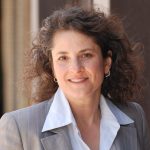 By Louise “Lou” Fischer–
By Louise “Lou” Fischer–
Happy 40th Anniversary to the San Francisco Bay Times! Congratulations and thank you to the publishers, editors, writers, photographers, distributors and supporters who have kept this important legacy of LGBT journalism going for all of these years.
Forty years ago, my focus was pretty narrow. Passing Driver’s Ed., getting a decent score on the SATs and blow-drying the life out of my naturally curly hair were my primary goals. In terms of gay and lesbian awareness, I actually knew a few gay people.
My mother was both an antique dealer and a former professional musician—that’s a double-dose of Gay—so, unlike many of my suburban Connecticut friends, I not only had exposure to gay people but also experienced an undercurrent of casual acceptance in my family that sure came in handy later! There was a constant flow of theatre people and antique dealers coming in and out of our house, and we learned that even though “Uncle Ronnie and Uncle Bruce” were both men, they were still a couple just like Mom and Dad (but with nicer cars and probably better vacations).
My own coming-out period was in the mid-1980s. While it was not a full 40 years ago, I did live through a significant period of LGBT history, so in the spirit of celebrating the Bay Times’ 40th Anniversary, this month’s column is a look back at the LGBT community from the 80s and 90s to today.
In the 1980s and early-1990s, LGBT social life revolved around bars, dance clubs, parties, events, lectures, sports teams and community groups. It was a simpler time. The Internet didn’t exist and you went to libraries, lectures, bookstores and the Bay Times for information about the LGBT community. If you wanted a romantic partner or a hook-up, you couldn’t “swipe a device”; you had to go out and meet people IRL (in real life).
Many of us, however, lived in secrecy and/or in fear of losing our families, jobs and even our lives. Employment and housing discrimination was rampant, and homosexuality was grounds for discharge from the military.
I struggled with my own coming out. I was a feminist and activist, but fear kept me from living my life authentically. The employee handbook of the major corporation where I worked included a clause defining homosexuality as “moral turpitude” and grounds for termination (thankfully that was eventually removed). When I attended public LGBT events, I had to conceal myself from photographers to avoid raising suspicion. Even organizations that served the community had to operate in the shadows or obscure their real name. “Gay and Lesbian Advocates and Defenders” labeled their correspondence “Park Square Advocates” to either protect their constituents from being outed or to safeguard straight allies from discrimination.
By the middle of the 1980s, the spread and fear of HIV/AIDS was terrorizing the community. At that time, an HIV diagnosis felt like a death sentence. We lost many men and women whom we loved and it felt like Washington, D.C., abandoned our community as the Reagan and H.W. Bush presidencies failed to respond to the crisis.
At many times, our community felt defeated. Yet while Reagan and Bush ignored us, we never gave up organizing and fighting for our rights. Colleagues started coming out of the closet. Employers began offering protections and equal benefits. Funding for HIV/AIDS research materialized, and life-saving drugs were developed.
In the 1980s and 1990s, we focused on surviving, but now we are thriving. LGBT people serve proudly in the military. We have federal recognition of same-sex marriage, and better—but not perfect—employment protection for LGBT employees. HIV/AIDS is treatable and, in some instances, preventable.
In the last 40 years, the LGBT community has made more progress on legal and social acceptance than any other group in history. Even in the early 2000s, I saw gay marriage as a distant and unrealistic aspiration; something that would be there for the next generation (millennials!) but not for baby-boomers like myself. And yet, in 2015, it was enacted into law by the Supreme Court. Whereas in the past being outed would derail a career of an elected official or sports/entertainment professional, today, gay actors, sports figures, musicians and elected officials are the norm and not as much the exception.
We’ve made great strides. Most of the current generation of young LGBT community members hopefully have never lost anyone close due to HIV/AIDS, have not experienced direct discrimination, and came out of the closet into a much more forgiving and accepting world. That said, with the current presidential administration, this could all evaporate in a puff of Republican cigar smoke, which is why, as Democratic Leader Nancy Pelosi says, “Don’t agonize. Organize!”
If you are agonizing and want to do more organizing, please join the Alice B. Toklas LGBT Democratic Club at the Annual Pride Breakfast on Sunday, June 24, at the Hyatt Embarcadero. The Breakfast ends just in time to join up with the Pride Parade! For information and tickets, go to: http://www.alicebtoklas.org/events/breakfast/
Louise “Lou” Fischer is the Immediate Past Co-Chair of the Board of Directors for the Alice B. Toklas LGBT Democratic Club and has served as an appointed and elected Delegate for the State Democratic Party. She is a San Francisco Commissioner and has served in leadership positions in multiple non-profit and community-based organizations.
Recent Comments